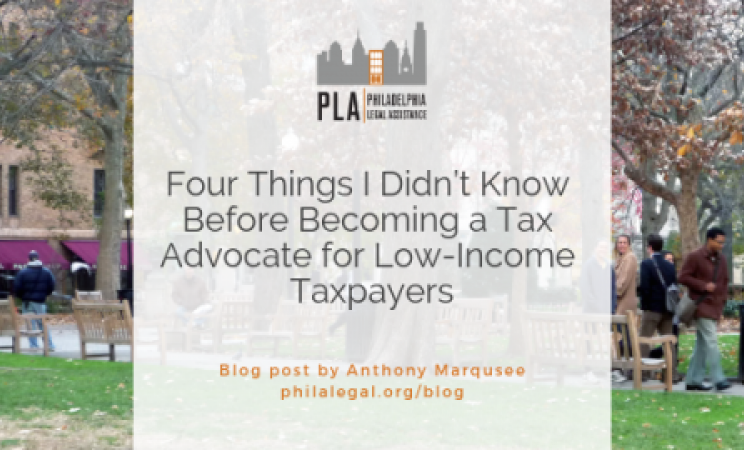Four Things I Didn’t Know Before Becoming an Advocate for Taxpayers

Before I started working as a tax advocate for low-income Philadelphians, I thought of audits as a problem of the wealthy, or at least the middle class. But since becoming a paralegal at the Philadelphia Legal Assistance Low Income Taxpayer Clinic, where my colleagues and I provide free legal advice to people facing problems with the IRS, I’ve realized that audits stretched further than I thought—and that they often cause huge problems for people living in poverty. Here’s what I learned:
1. Audits aren’t just for the rich.
An audit is a process by which the Internal Revenue Service (IRS) confirms that you are paying the correct amount of taxes based on your income, children and other dependents, and other factors. Though only a small percent of people are audited every year, low-income people are audited at higher than average rates: in 2017, over 41% of individual IRS audits were of taxpayers earning between $0 and $25,000 per year (though they accounted for just 36% of returns filed).1 Many of these are individuals who claim the Earned Income Tax Credit (EITC), a credit that can refund thousands of dollars to eligible taxpayers who have earned income, especially those with one or more children.
2. The stakes are high.
For households living in poverty, the EITC is a boon that can help them catch up on bills and pay for emergency expenses. However, failure to satisfy an IRS audit can cause the government to deny the EITC--or even retroactively revoke it, turning a much-needed cash infusion into a government debt, with penalties and interest piled on.
3. It’s not easy to respond to an audit.
The idea behind an IRS audit is simple enough: show us documents proving the claims you made on your tax return. If you can’t show proof, no credit. In practice, however, the audit process is full of barriers that can prevent even well-intentioned people from complying.
What do these barriers look like? For one thing, the IRS conducts most audits by mail, which means they send a series of letters to the taxpayer’s last known address. However, low-income people are more likely to face housing instability, whether through homelessness or frequent evictions. If they don’t update their address with the post office each time they move (and sometimes even if they do), the IRS may have denied them by the time they learn they were audited.
In addition, EITC audits require taxpayers to prove that their children lived with them during the year in question. For families who spent the year in and out of shelters, relatives’ homes, and housing of their own, it may be nearly impossible to find written proof that they resided together for the required six months.
Lastly, taxpayers whose primary language is one other than English may face the additional challenge of being unable to understand IRS notices. Even those who do speak English often feel intimidated by the legal tone of the letters or struggle to decipher them. Too frequently, people confused by IRS letters simply don’t respond and forfeit thousands of dollars as a result.
4. It’s hard to get help.
While many low-income people have access to free tax preparation or filing services through online software or Volunteer Income Tax Assistance sites, these sources’ help ends precisely where an audit begins: after the return is filed.
Unlike wealthier filers, low-income people can rarely afford to hire an accountant or other professional to help them meet IRS audit requirements. Audit notices provide an IRS phone number to call for assistance, but the lines are open mostly during the work day, hold times regularly exceed an hour, and customer service is notoriously hit-or-miss. These limitations create serious barriers to finding help.
Free Legal Help at PLA
For follow-up problems with the IRS, the LITC where I work is often the only resource left. Our two attorneys and I handle cases for clients who are among the 26% of Philadelphians living in poverty. I value being able to help clients who may have nowhere else to turn, helping them get refunds they depend on and find ways to settle IRS debt. But I’d also like it if fewer people needed to rely on our services. The IRS audits nearly a million people each year, so systems that ordinary people can navigate are crucial for building public confidence and making sure we all get the refunds we are entitled to.
More accessible IRS communication, clearer pathways to help, or better methods for deciding which taxpayers to audit could all reduce harm to low-income taxpayers and help make sure that credits designed to lift people out of poverty don’t end up keeping them there instead.
The deadline to file your tax return is April 15th, 2021. If you are a Philadelphia resident and need assistance filing United Way has resources to help.

